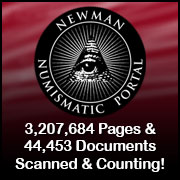
About UsThe Numismatic Bibliomania Society is a non-profit association devoted to the study and enjoyment of numismatic literature. For more information please see our web site at coinbooks.org SubscriptionsThose wishing to become new E-Sylum subscribers (or wishing to Unsubscribe) can go to the following web page link MembershipThere is a membership application available on the web site Membership Application To join, print the application and return it with your check to the address printed on the application. Print/Digital membership is $40 to addresses in the U.S., and $60 elsewhere. A digital-only membership is available for $25. For those without web access, write to: Charles Heck, Treasurer AsylumFor Asylum mailing address changes and other membership questions, contact Chuck at this email address: treasurer@coinbooks.org SubmissionsTo submit items for publication in The E-Sylum, write to the Editor at this address: whomren@gmail.com
BUY THE BOOK BEFORE THE COINSale Calendar
|
- WAYNE'S WORDS: THE E-SYLUM JANUARY 17, 2021
- STEPHEN ALBUM AUCTION 39 NUMISMATIC LITERATURE
- NEW BOOK: COINS OF THE ROMAN REVOLUTION
- NEW BOOK: THE UNUSUAL SUSPECT
- THEODORE HENRY YOUNG (1936-2021)
- NEWMAN PORTAL ADDS PAPER ON C. WYLLS BETTS
- ANA TRIVIA ANSWER: J. A. HECKELMAN
- RICHARD LOBEL ON HANS AND JACQUES SCHULMAN
- MORE DUAL IMAGE OPTICAL ILLUSIONS IN METAL
- NOTES FROM E-SYLUM READERS: JANUARY 17, 2021
- CELLPHONE PHOTOS TOOK OVER THE COIN MARKET
- U.S. MINT INTRODUCES NEW SEVEN-CENT COIN
- THE CIRCULATING COLLECTIBLE COIN REDESIGN ACT
- THE TRAGIC LIFE OF MODEL AUDREY MUNSON
- VOCABULARY TERM: STRIKING
- THOMAS KING BIRCH, JR. (1812-1883)
- HARVEY STACK'S NUMISMATIC FAMILY, PART 87
- JOHN THOMPSON AND CHASE MANHATTAN BANK
- CHICAGO HALL OF FAME INDUCTS ALDEN SCOTT BOYER
- CHICAGO HALL OF FAME INDUCTS CARL WOLF
- NYINC AWARDS MEDAL OF MERIT TO WETTERSTROM
- 2022 NEW YORK INTERNATIONAL PLANNED
- SYLVESTER ANNAMESE MEDALS AND ORDERS
- ARCHIVES INTERNATIONAL AUCTION 64
- DAVID LAWRENCE JANUARY 31, 2021 SUPER SALE
- DNW SALE INCLUDES NEWMAN IRISH HALFPENNY
- ROBINSON ANCIENT COIN SALE 115 ANNOUNCED
- MEDIEVAL AND ROMAN COIN HOARD FOUND IN HUNGARY
- MEDIEVAL JAPANESE COIN HOARD FOUND
- THE TEMPLETON REID MINT
- THE MEXICAN COIN MADE AT THE NEW ORLEANS MINT
- CHINA MINTS SRI LANKA CENTRAL BANK COIN
- SARAH SOPHIA BANKS AND THE ‘CONTINENTAL DOLLAR’
- FRANKLIN'S 1729 TRACT ON PAPER CURRENCY
- DEL MONTE BANANA LABEL ERROR NOTE POPULAR
- LOOSE CHANGE: JANUARY 17, 2021
Click here to read the thin version on the web
Click here to subscribe
Click here to access the complete archive
To comment or submit articles, reply to whomren@gmail.com
Content presented in The E-Sylum is not necessarily researched or independently fact-checked, and views expressed do not necessarily represent those of the Numismatic Bibliomania Society.
WAYNE'S WORDS: THE E-SYLUM JANUARY 17, 2021
 New subscribers this week include:
David Stewart.
Welcome aboard! We now have 6,606 subscribers.
New subscribers this week include:
David Stewart.
Welcome aboard! We now have 6,606 subscribers.
Thank you for reading The E-Sylum. If you enjoy it, please send me the email addresses of friends you think may enjoy it as well and I'll send them a subscription. Contact me at whomren@gmail.com anytime regarding your subscription, or questions, comments or suggestions about our content.
This week we open with a numismatic literature sale, two new books, an obituary, an update from the Newman Numismatic Portal, and more.
Other topics this week include Hans and Jacques Schulman, cellphone coin photos, the Circulating Collectible Coin Redesign Act, model Audrey Munson, Thompson’s Bank-Note Reporter, the Chicago Coin Club Hall of Fame, the Richard Margolis Medal of Merit, multiple numismatic auctions, new coin hoards, the Templeton Reid Mint, and Ben Frsanklin's 1729 tract on paper currency.
To learn more about Georgian Coins, the medals of Karl Goetz, coins of the Roman revolution, dealer Ted Young, optical illusions in tokens and medals, the seven-cent coin, Chase Manhattan Bank, Alden Boyer, Carl Wolf, Kerry Wetterstrom, Annamese orders and medals, a Draper, Underwood, Bald & Spencer sample sheet, an 1874-CC Half Eagle, a rare Irish Pattern Halfpenny, the Mexican coin made at the New Orleans Mint, the Del Monte error note, and the upcoming semiquincentennial coins, read on. Have a great week, everyone!
Wayne Homren
Editor, The E-Sylum
STEPHEN ALBUM AUCTION 39 NUMISMATIC LITERATURE
Here are some selected numismatic literature lots in the upcoming Stephen Album Rare Coins Auction 39. To view all of the lots, see: https://www.sarc.auction/Stephen-Album-Rare-Coins-Auction-39_as69846 . Lots of great world coin references at affordable prices. Build your working library, or fill in some holes on your shelves. -Editor
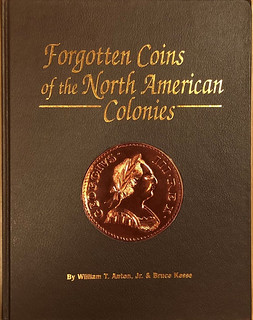
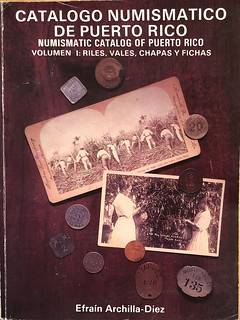
Lots 4025 and 4026
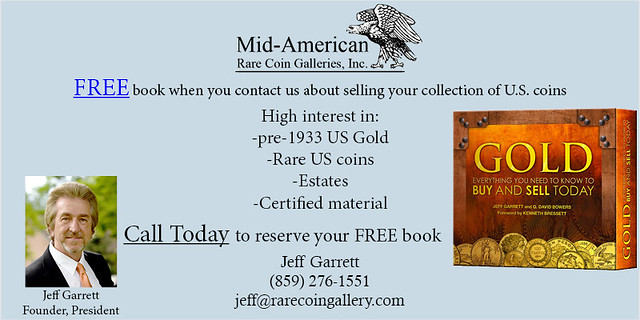
NEW BOOK: COINS OF THE ROMAN REVOLUTION
A new book has been published on the coins of the Roman revolution. -Editor
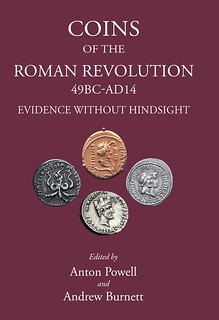 Coins of the Roman Revolution, 49 BC-AD 14
Coins of the Roman Revolution, 49 BC-AD 14
Evidence Without Hindsight
Edited by Anton Powell and Andrew Burnett and contributions by Lucia F. Carbone, Hannah Cornwell and Guillaume de Méritens de Villeneuve
Coins of the best-known Roman revolutionary era allow rival pretenders to speak to us directly. After the deaths of Caesar and Cicero (in 44 and 43 BC) hardly one word has been reliably transmitted to us from even the two most powerful opponents of Octavian: Mark Antony and Sextus Pompeius - except through coinage and the occasional inscription. The coins are an antidote to a widespread fault in modern approaches: the idea, from hindsight, that the Roman Republic was doomed, that the rise of Octavian-Augustus to monarchy was inevitable, and that contemporaries might have sensed as much.
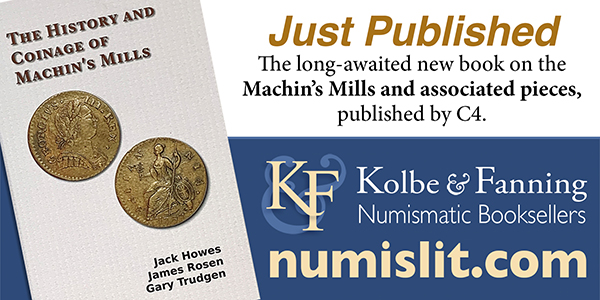
NEW BOOK: THE UNUSUAL SUSPECT
While non-numismatic, the topics of treasure finds and bank robbers are often of interest. Crimereads published an excerpt of a new book on a modern "Robin Hood" bank robber. -Editor
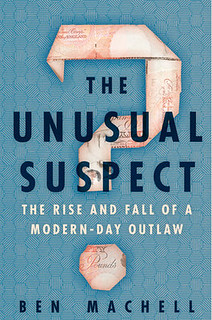 The name of the young man in the interview room at Vermont’s Southern State Correctional Facility was Stephen George Dennis Jackley. He was twenty-two years old and came from a small town called Sidmouth on the South Devon coast. He was a geography student at the University of Worcester. As a rule, geography students from Devon do not tend to find themselves consigned to the Hole. Or known to Interpol. Or being interrogated by a pair of U.S. federal agents. Or, for that matter, being the subject of a multiagency, multinational criminal investigation. But Stephen Jackley was not like most geography students.
The name of the young man in the interview room at Vermont’s Southern State Correctional Facility was Stephen George Dennis Jackley. He was twenty-two years old and came from a small town called Sidmouth on the South Devon coast. He was a geography student at the University of Worcester. As a rule, geography students from Devon do not tend to find themselves consigned to the Hole. Or known to Interpol. Or being interrogated by a pair of U.S. federal agents. Or, for that matter, being the subject of a multiagency, multinational criminal investigation. But Stephen Jackley was not like most geography students.
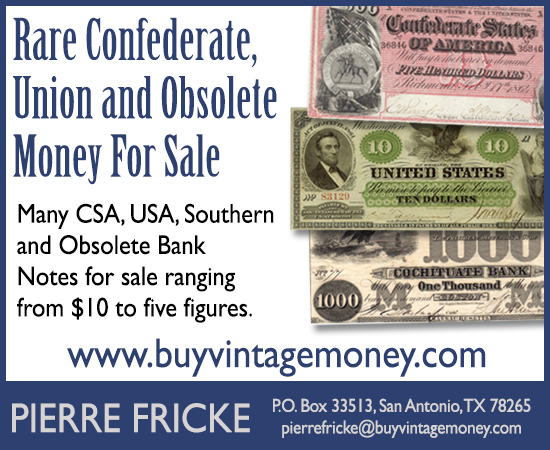
THEODORE HENRY YOUNG (1936-2021)
Dealer Ted Young of Western Pennsylvania has passed. -Editor
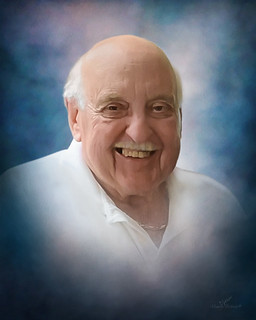 Theodore Henry Young of Chippewa Twp. passed away at 84 on Thursday, January 7, 2021 in Select Specialty Hospital-Boardman in Youngstown, OH.
Theodore Henry Young of Chippewa Twp. passed away at 84 on Thursday, January 7, 2021 in Select Specialty Hospital-Boardman in Youngstown, OH.
Born January 26, 1936, on a 111-acre farm in Chippewa, Ted built his strong work ethic helping his family on the homestead while attending Beaver Falls High School. After graduating, he joined the Army, then worked for his aunt and uncle at Reed’s Dairy. He started his own milk delivery business with his brother, Dave in 1964. Over a decade they grew their delivery route from 7 families to over 1,100.
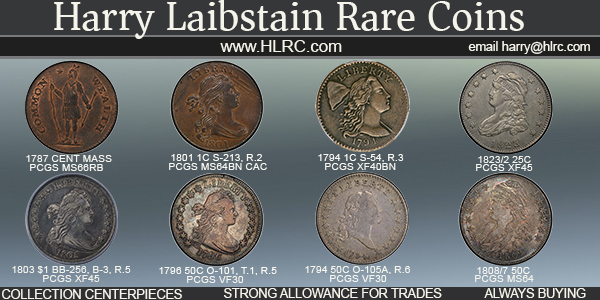
NEWMAN PORTAL ADDS PAPER ON C. WYLLS BETTS
The latest addition to the Newman Numismatic Portal is a paper about author C. Wylls Betts. Project Coordinator Len Augsburger provided the following report. Thanks. -Editor
Newman Portal Adds Paper on C. Wylls Betts
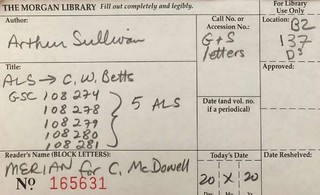 Following up on the Betts’ biography appearing in the January 10th E-Sylum, Chris McDowell contributed an in-depth exploration of the identity of Mrs. Charles Wyllys Betts, said to have been married to Betts from 1879-1880. As part of a Newman Grant, awarded in May 2020 for the purposes of numismatic research, McDowell has been working on the subject of Fugio cents and Betts’ involvement with the Fugio restrike dies. The discovery of Betts papers at the Morgan Library in New York demanded further investigation, and, in this paper, McDowell delivers convincing evidence that in fact “Mrs. Charles W. Betts” never existed, and that references to her actually refer to Betts’ sister-in-law Louise (Holbrook) Betts.
Following up on the Betts’ biography appearing in the January 10th E-Sylum, Chris McDowell contributed an in-depth exploration of the identity of Mrs. Charles Wyllys Betts, said to have been married to Betts from 1879-1880. As part of a Newman Grant, awarded in May 2020 for the purposes of numismatic research, McDowell has been working on the subject of Fugio cents and Betts’ involvement with the Fugio restrike dies. The discovery of Betts papers at the Morgan Library in New York demanded further investigation, and, in this paper, McDowell delivers convincing evidence that in fact “Mrs. Charles W. Betts” never existed, and that references to her actually refer to Betts’ sister-in-law Louise (Holbrook) Betts.
McDowell cites a contemporary record from the American Numismatic Society noting that Charles Betts never married, and further explains how a cataloging error at the Morgan Library turned into a person who never existed. McDowell intends to continue his research in Manchester (UK), working with the Matthew Boulton papers to investigate the involvement of Boulton and James Jarvis with the Fugio cents.
THE BOOK BAZARRE
ANA TRIVIA ANSWER: J. A. HECKELMAN
Pete Smith submitted this answer to the question he posed last week: Who was the person who served as First Vice President for the ANA during 1899-1901?. Thanks! -Editor
Last week I posed the question: Who served as ANA First Vice President during 1899-1901?

RICHARD LOBEL ON HANS AND JACQUES SCHULMAN
London dealer Richard Lobel submitted these remembrances of fellow dealers Hans and Jacques Schulman. Thank you! -Editor
Hans and Jacques Schulman
As I knew both of them quite well, I would like to submit my memories of both of them. Perhaps your readers might enjoy a trip in the past.
Yes, they were related but they were as they say in Britain, like chalk and cheese. But then again if you have 200 dealers in a room, they will do things in 200 different ways. Each will think they are correct and most will earn a living. Coin dealers are different from real people.

MORE DUAL IMAGE OPTICAL ILLUSIONS IN METAL
Regarding hidden images in coin designs, Paul Horner writes:
"Here is an aluminum dollar size token of the late Leon Hendrickson. I believe the obverse was also used on Mardi Gras tokens. (Hint: examine "Leons's profile closely)"
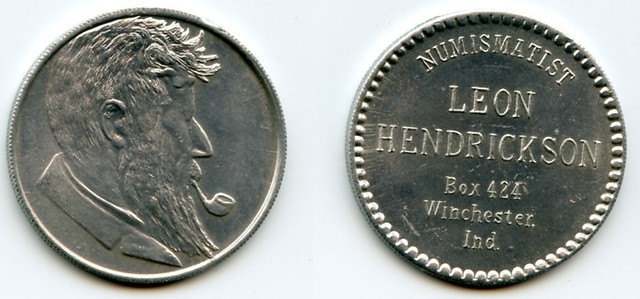
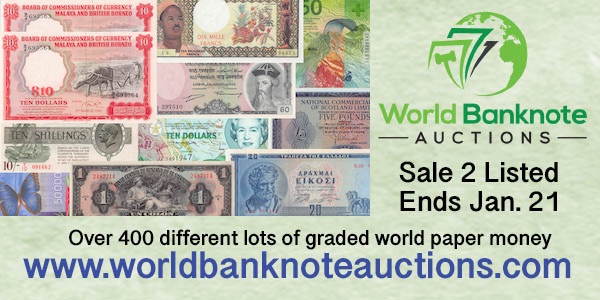
NOTES FROM E-SYLUM READERS: JANUARY 17, 2021
My Neighbor, Hans Schulman
Bob Steinberg writes:
"Just as a fun fact when I lived in NYC in the 1960's and had a shop down the street from Lester Merkin (our address was 137 E. 56th st) Hans Schulman lived in the same apartment complex on the west side of Manhattan called "Lincoln Towers" (located near Lincoln Center). I used to see him from time to time in our neighborhood. The other famous resident of our complex was Henny Youngman, the old time comedian famous for the line "take my wife---PLEASE!"
Other topics this week include David Fiero, and the 1909-S VDB Lincoln Cent. -Editor
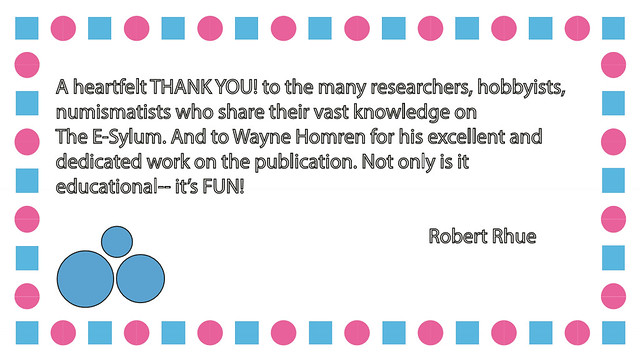
CELLPHONE PHOTOS TOOK OVER THE COIN MARKET
In a recent blog post, Doug Winter discusses "Numismatic Radiology: How Cellphone Photos Took Over the Coin Market in 2020". Here's an excerpt - see the complete article online. -Editor
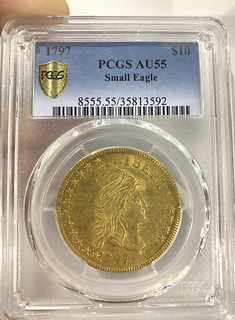 Beginning about three or four years ago, I noticed an ever-increasing amount of my business involved cellphone pictures of coins. This was especially true from the aspect of buying. And as the coin market had to re-invent itself in 2020 due to Covid 19, a significant amount of business became cellphone-driven. If I had to guess, I would say that close to 50%—if not more—of all dealer-to-dealer business is now done off of cellphone images.
Beginning about three or four years ago, I noticed an ever-increasing amount of my business involved cellphone pictures of coins. This was especially true from the aspect of buying. And as the coin market had to re-invent itself in 2020 due to Covid 19, a significant amount of business became cellphone-driven. If I had to guess, I would say that close to 50%—if not more—of all dealer-to-dealer business is now done off of cellphone images.
This is both great and terrible. The “great” part of the equation is that dealers found a viable way to quickly move new coins. The “terrible” part is that these transactions tend to be sight-unseen and unless a dealer is very sophisticated and knows how to read a cellphone image of a coin (and others factors as well) he is going to get stuck with some really low-end coins.
In the title of this blog, I referred to radiology and this is only partly a joke. Cellphone images of coins can be interpreted if you know what to look for, just as a radiologist uses medical imaging to diagnose and treat diseases.
Here are some tips which might make the next cellphone image you get a little easier to interpret.
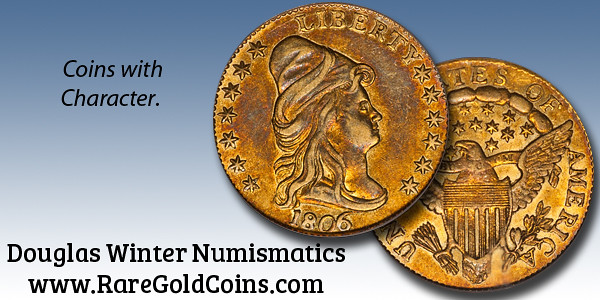
U.S. MINT INTRODUCES NEW SEVEN-CENT COIN
In the breaking news department, Arthur Shippee passed along this report on the new coin introduced by the U.S. Mint. Thanks! -Editor
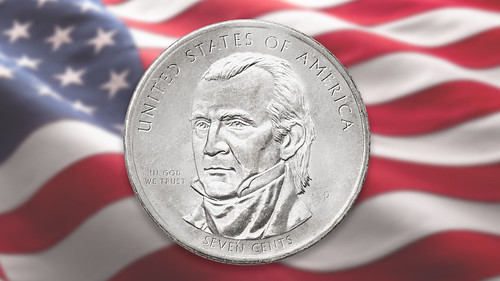

THE CIRCULATING COLLECTIBLE COIN REDESIGN ACT
And here's a very impressive piece of real news from the U.S. Mint. Republished with permission from the Mint News Blog. Thanks. -Editor
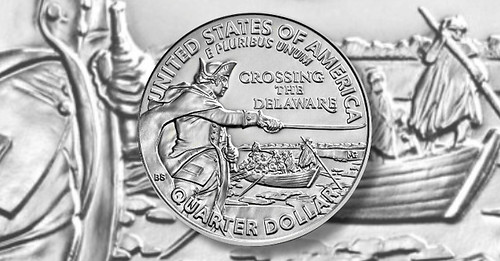
On January 13, 2021, President Donald Trump signed into law a bill known as the “Circulating Collectible Coin Redesign Act of 2020.” The bill was first introduced in the House of Representatives by Rep. Barbara Lee, D-CA, on March 27, 2020, and is quite comprehensive, affecting every circulating coinage denomination from the cent to the dollar over the next nine years, plus significant new medals and silver bullion coins.
Here is a summary of some of the changes the Circulating Collectible Coin Redesign Act of 2020 brings in the near future:
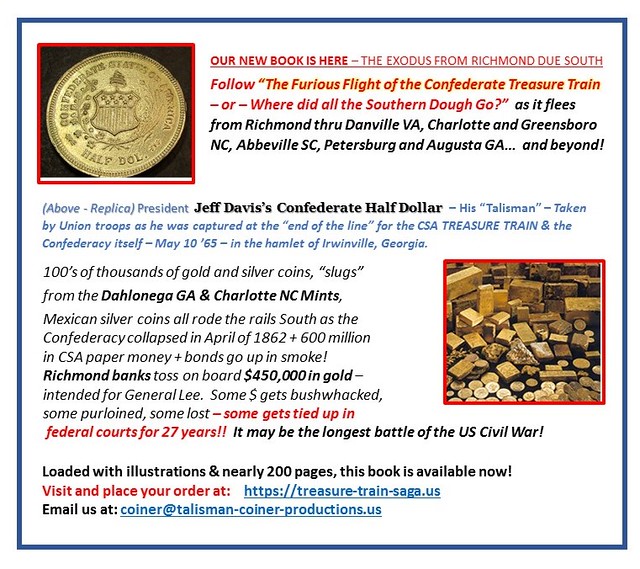
THE TRAGIC LIFE OF MODEL AUDREY MUNSON
In 2016 we discussed a new book on the life of model and actress Audrey Munson, who modelled for coin artist Adolph Weinman. A new article in the Washington Post quotes the book author James Bones and numismatist Dave Bowers. Here's an excerpt. -Editor
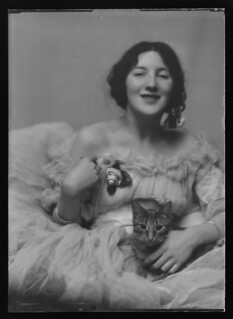 Q. David Bowers has two passions: coins — he’s one of the country’s leading numismatists — and the early history of Hollywood. In Audrey Munson, those two passions intersected.
Q. David Bowers has two passions: coins — he’s one of the country’s leading numismatists — and the early history of Hollywood. In Audrey Munson, those two passions intersected.
Many coin collectors believe the artists’ model was the inspiration for the figure on the Mercury head dime, designed in 1916 by Adolph Weinman. And Munson starred in a handful of famed silent films.
The first was the now-lost 1915 movie, “Inspiration.” In the 1980s, Bowers was researching the history of the studio that made it, Thanhouser. He was determined to trace the lives of as many studio figures as possible. Miraculously, he found Audrey Munson.
“She was still alive,” Bowers told me.
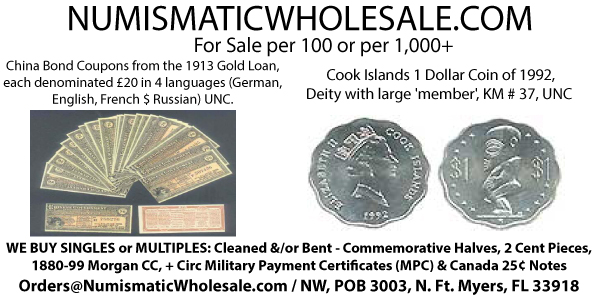
VOCABULARY TERM: STRIKING
Here's another entry from Dick Johnson's Encyclopedia of Coin and Medal Terminology. -Editor
Striking. Forming relief objects by an impression with a pair of dies and the force of a press. Presses utilize two dies, one obverse, one reverse, to impart the design on both sides at once. The first press, used at the beginning of the 16th century, were screw presses. They were able to strike small thin coins and were powered by man, or more likely two men. Each pressed against a long bar that transferred the motion – by a transversal screw – a downward thrust of a housing containing one of the dies (usually the reverse, where the obverse die is fixed in the pile position below). Pressing creates the raised relief on both sides of the struck piece at one time.
The screw press was used for nearly 400 years. Its improvement came slowly at first, but as the presses were built stronger and with attachments to feed blanks and eject struck pieces, the striking improved. As power changed from man to horse to steam power, larger diameter pieces could be struck with greater depth of impression.

THOMAS KING BIRCH, JR. (1812-1883)
Here's another entry from the online draft of John Lupia's book of numismatic biographies. Thanks! This is an excerpt with the full article and bibliography available online. This week's subject is Thomas King Birch, Jr. -Editor
Thomas King Birch, Jr. (1812-1883), was born on May 1, 1812 at Philadelphia, Pennsylvania, the son of the famous English born artist, Thomas Birch (1779-1851). His grandfather was William Russell Birch (1755-1834), of Warwickshire, England, who published, Birch's Views of Philadelphia (1800), and who is attributed by some as the engraver of the so-called Birch Cent of 1792. William first came to Philadelphia in 1772. Currently, no documentary evidence supports the attribution of his engraving the Birch Cent, though some American numismatists still argue in its favor. William Russell Birch was born the son of Thomas Birch (1715-1798?) and Anne Russell (1713-1804). The engraver of the Birch Cent might be William's father, not his son.
HARVEY STACK'S NUMISMATIC FAMILY, PART 87
The latest article in Harvey Stack's blog series wraps up his discussion of the firm's 1982 sales. Thanks. -Editor
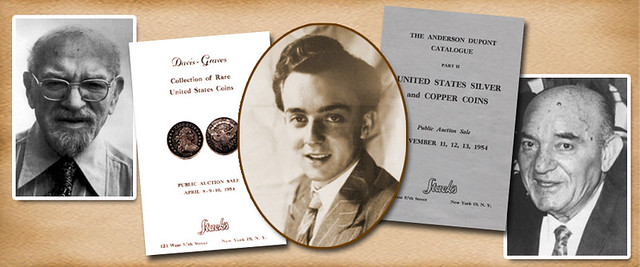
Our stellar series of 1982 auction sales continued in March, when Princeton University consigned a substantial collection of world gold and silver coins to raise funds to expand a variety of library services. In addition, other consignments of United States coins brought the lot count for this event to 1,484 lots.
In May Stack's conducted the annual Metropolitan New York Numismatic Convention Auction, as we had for many years. It featured a comprehensive offering of over 1,550 lots of Ancient and World coins and United States coins. The sale was designed to attract collectors of many different series to help make the convention's attendance a great success. The variety of types as well as a wide range of grades were included in the sale, enhancing its wide-ranging appeal. Our June sale of over 1,300 lots also offered United States and World coins, and once again featured items that would appeal to a beginner as well as superb rarities for specialized collectors.
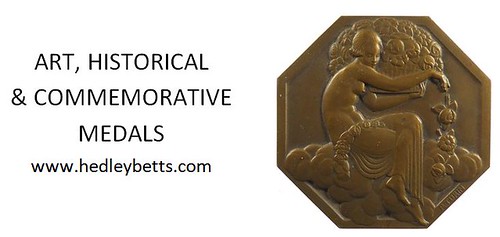
JOHN THOMPSON AND CHASE MANHATTAN BANK
Economic historian John Steele Gordon writes a column for the ABA Banking Journal. This month's installment has a numismatic literature connection - the publisher of Thompson’s Bank-Note Reporter also founded one of the largest banks in the country. -Editor
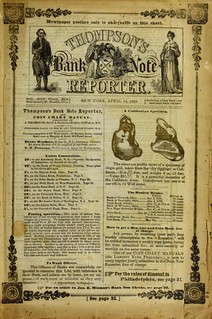 In the last column I wrote about the curious origin of the Bank of the Manhattan Company. Another major antecedent company of what is today JPMorgan Chase was Chase National Bank, founded by John Thompson in 1877.
Thompson had been born in Peru, Massachusetts, in 1802. After a stint as a lottery dealer in Albany, New York, he moved to New York City in 1832 and became a dealer in bank notes. At that time state-chartered banks issued bank notes and there were thousands of different issues—some sound, some fraudulent.
In the last column I wrote about the curious origin of the Bank of the Manhattan Company. Another major antecedent company of what is today JPMorgan Chase was Chase National Bank, founded by John Thompson in 1877.
Thompson had been born in Peru, Massachusetts, in 1802. After a stint as a lottery dealer in Albany, New York, he moved to New York City in 1832 and became a dealer in bank notes. At that time state-chartered banks issued bank notes and there were thousands of different issues—some sound, some fraudulent.
In 1836, Thompson founded Thompson’s Bank-Note Reporter, a weekly that sought to sort out the good notes from the bad ones. (Thompson’s Bank-Note Reporter is the progenitor of today’s American Banker, which due to its name is often assumed to be published by the American Bankers Association, although it remains an unaffiliated publication. In fact, it took its name a decade after the founding of ABA, which leaves any blame for the confusion at the feet of American Banker’s long-ago owners.)
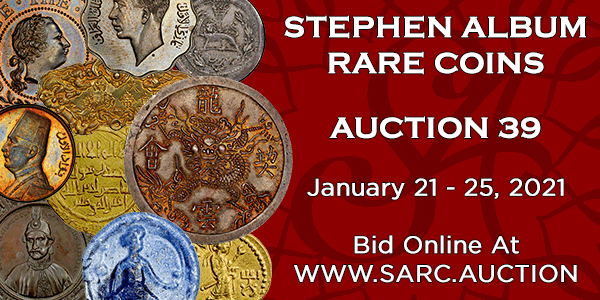
CHICAGO HALL OF FAME INDUCTS ALDEN SCOTT BOYER
The Chicago Coin Club has announced the thirteenth inductee into its Hall of Fame. -Editor
Inducts Alden Scott Boyer Into its Hall of Fame
The Chicago Coin Club announces that the thirteenth person to be inducted into its Hall of Fame is Alden Scott Boyer. His Hall of Fame citation has been published on the club’s Hall of Fame web page, www.chicagocoinclub.org/projects/hof .
CHICAGO HALL OF FAME INDUCTS CARL WOLF
The Chicago Coin Club also announced the fourteenth inductee into its Hall of Fame (and first living member) Carl Wolf. Congratulations! -Editor
Inducts Carl Wolf Into its Hall of Fame
The Chicago Coin Club announces that the fourteenth person to be inducted into its Hall of Fame is Carl Wolf. His Hall of Fame citation has been published on the club’s Hall of Fame web page, www.chicagocoinclub.org/projects/hof .
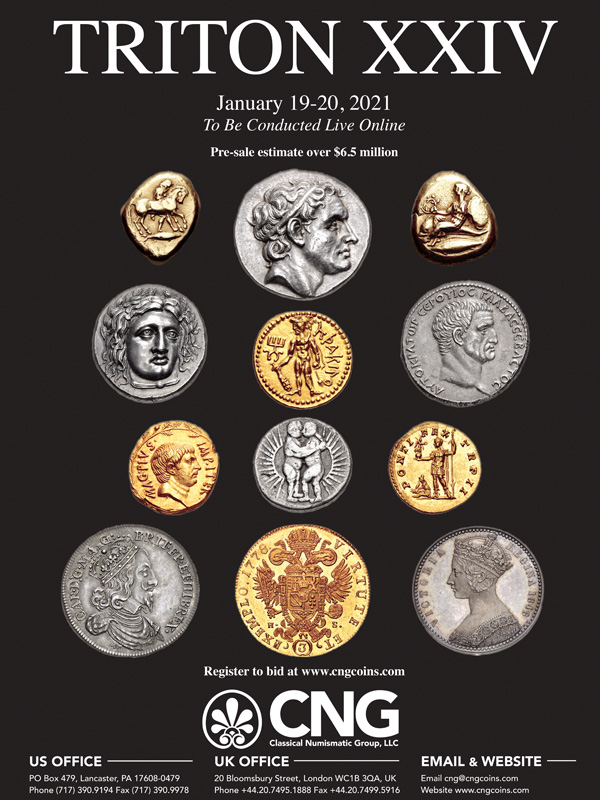
NYINC AWARDS MEDAL OF MERIT TO WETTERSTROM
The New York International Numismatic Convention (NYINC) has created the Richard Margolis Medal of Merit; the inaugural honoree is Kerry Wetterstrom. Congratulations! Here's the press release. -Editor
Honors Kerry Wetterstrom
Named as Recipient of Inaugural Richard Margolis Medal of Merit
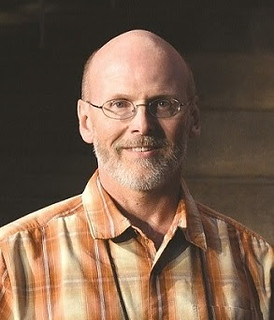 Kevin Foley, Bourse Chairman for the New York International Numismatic
Convention, has announced that the NYINC board has named Kerry Wetterstrom
to receive the inaugural Richard Margolis Medal of Merit.
Kevin Foley, Bourse Chairman for the New York International Numismatic
Convention, has announced that the NYINC board has named Kerry Wetterstrom
to receive the inaugural Richard Margolis Medal of Merit.
Foley said, “Richard Margolis was the guiding force in the original founding of the NYINC and hands on managed and administered our event for many years. In addition, he was a significant dealer and researcher in the field of French numismatics. Naming our medal of merit in his honor will remind future generations of his significant contributions to numismatics.”
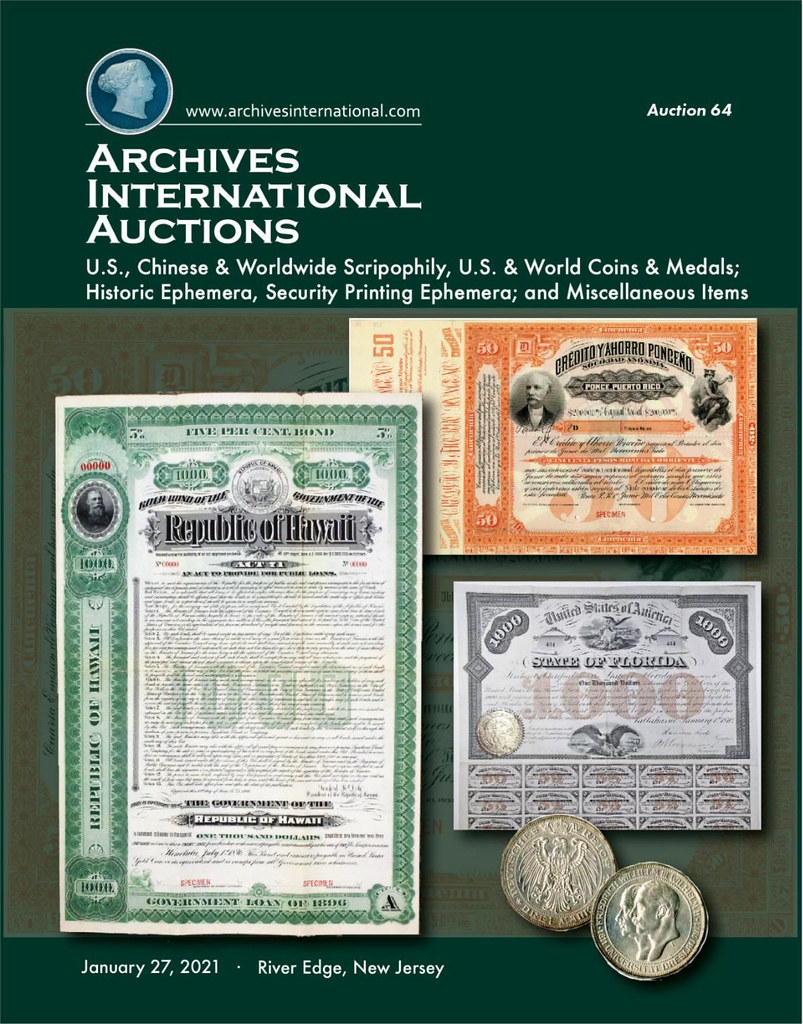
2022 NEW YORK INTERNATIONAL PLANNED
Although this year's New York International has been cancelled, plans are underway for the 2022 event. Here's the press release. -Editor
50th Annual Foreign and Ancient Specialty Event
 Kevin Foley, long time bourse chairman for the New York International
Numismatic Convention, has announced the preliminary schedule for the
convention’s 50th annual edition.
Kevin Foley, long time bourse chairman for the New York International
Numismatic Convention, has announced the preliminary schedule for the
convention’s 50th annual edition.
The event will once again be held at the Grand Hyatt New York, located at 109 East 42nd Street between Park and Lexington Avenues. The Grand Hyatt enjoys a direct indoor connection with Grand Central Station, terminus of the Metro North commuter system, as well as having stops for multiple subway lines.
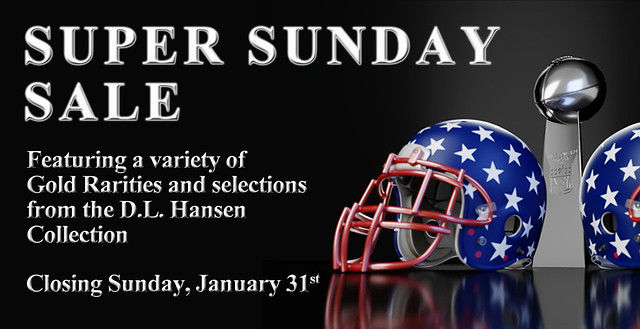
SYLVESTER ANNAMESE MEDALS AND ORDERS
The Stephen Album Rare Coins Auction 39 features an amazing collection of Annamese Medals and Orders. Here's the press release. -Editor
The John Sylvester Jr. Collection of Annamese Medals and Orders will be featured in the upcoming Stephen Album Rare Coins Auction 39 (January 21-25, 2021). It is highlighted by several pieces never-before seen at auction. A quick overview of the Collection will show that it is unrivaled in its specialty and promises to be the premier auction to date of Annamese Orders and Medals. The catalog should be a reference for this material for years to come.
One of the premier experts and authors on Southeast Asian phaleristics, John Sylvester Jr. (1930), inherited a love for Asian antiques from his father, a decorated vice admiral who was stationed in China in the late 1930’s. After seeing combat near the end of the Korean War, he entered the Foreign Service in 1955 and began a ten-year tenure in Japan, where he met his future wife, Mayumi. A seasoned diplomat, he was assigned in 1968 to South Vietnam and tasked with advising various provinces along the Cambodian border. It was in that volatile milieu that John developed an interest in medals, which eventually became an addiction. After retirement, he became the first director of the NC Japan Center in 1981 and amassed in a single room in his home in Raleigh a panoply of military paraphernalia, including hats, aiguillettes, flags, bayonets, flare guns, and one of the finest collections of Indochinese medals and orders in the world.
THE BOOK BAZARRE
ARCHIVES INTERNATIONAL AUCTION 64
Here is the announcement for the January 27, 2021 sale by Archives International Auctions. -Editor
HISTORIC REPUBLIC OF HAWAII, 1896 GOVERNMENT BONDS AT AUCTION WITH OVER 1100 ADDITIONAL SCRIPOPHILY, COIN & EPHEMERA LOTS AT ARCHIVES INTERNATIONAL AUCTIONS JANUARY 27, 2021 AUCTION
The auction will be held by Archives International Auctions at their offices in River Edge, N.J.
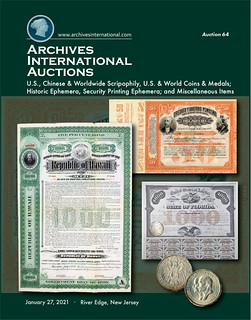 The January 27 th , 2021 auction by Archives International Auctions will
consist of 1114 lots offered beginning with 948 lots of U.S. and Worldwide Scripophily followed by 165 lots of Historic Ephemera, Security Printing Ephemera and U.S. and World Coins, Medals and Military Decorations and ending with U.S. and World Checks, Drafts and Exchanges.
The January 27 th , 2021 auction by Archives International Auctions will
consist of 1114 lots offered beginning with 948 lots of U.S. and Worldwide Scripophily followed by 165 lots of Historic Ephemera, Security Printing Ephemera and U.S. and World Coins, Medals and Military Decorations and ending with U.S. and World Checks, Drafts and Exchanges.
“During this difficult time period for our country and the world, we are striving to offer our clients and friends items of historical and collecting interest that have been off the market for decades or are new to the collecting world. We hope this auction will add a small amount of enjoyment to everyone’s lives”, stated Dr. Robert Schwartz, President of Archives International Auctions. “Included in the upcoming auction is a wide variety or rare, interesting and desirable numismatic and historical objects to enhance the collections of every level of collector and dealer”.
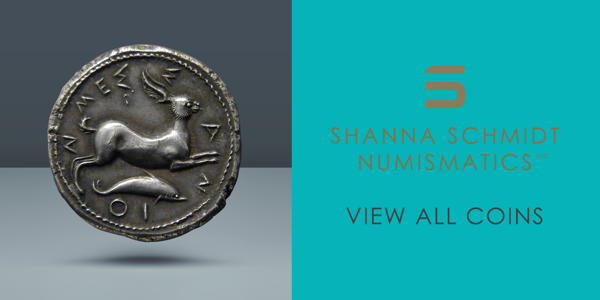
DAVID LAWRENCE JANUARY 31, 2021 SUPER SALE
Here's the press release for the upcoming David Lawrence Rare Coins January 31, 2021 sale. -Editor
 David Lawrence Rare Coins (DLRC) is proud to announce the upcoming
Super Sunday Sale, featuring a wide variety of Gold Rarities and more selections from the D.L.
Hansen Collection, the Greatest Collection of U.S. Coins, in our upcoming Sunday Internet
Auction #1154. The selection of gold rarities and pieces de-accessioned from the D.L. Hansen
Collection are available for bidding, with lots closing between 8:00pm EST and 11:00pm EST
on Sunday, January 31 st . Showcasing DLRC’s extend-a-bid feature, every coin will have 3
minutes added to its closing time with each bid placed in the closing 3 minutes, giving you the
live auction experience from the comfort of your own home.
David Lawrence Rare Coins (DLRC) is proud to announce the upcoming
Super Sunday Sale, featuring a wide variety of Gold Rarities and more selections from the D.L.
Hansen Collection, the Greatest Collection of U.S. Coins, in our upcoming Sunday Internet
Auction #1154. The selection of gold rarities and pieces de-accessioned from the D.L. Hansen
Collection are available for bidding, with lots closing between 8:00pm EST and 11:00pm EST
on Sunday, January 31 st . Showcasing DLRC’s extend-a-bid feature, every coin will have 3
minutes added to its closing time with each bid placed in the closing 3 minutes, giving you the
live auction experience from the comfort of your own home.
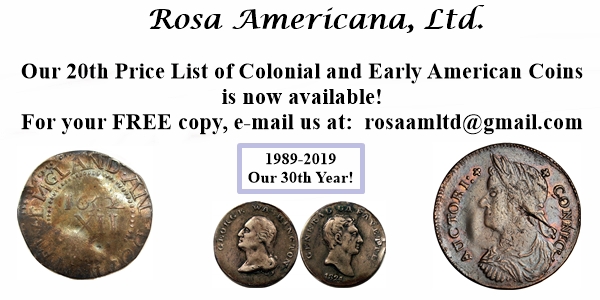
DNW SALE INCLUDES NEWMAN IRISH HALFPENNY
This press release from Dix Noonan Webb in London discusses their upcoming February 2021 sale and features a rare Irish Pattern Halfpenny from the Eric P. Newman collection. -Editor
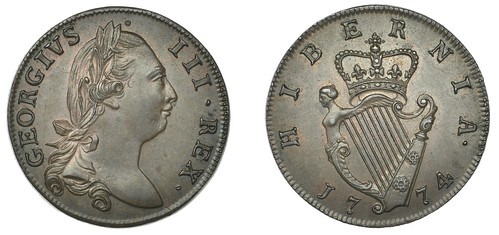
An extremely rare Irish Proof or Pattern Halfpenny that was bought for the equivalent of $2 many years ago will be offered in a live/online auction of Coins and Historical Medals on Tuesday February 2, 2021 by International coins, medals, banknotes and jewellery specialists Dix Noonan Webb via their website www.dnw.co.uk.
From the collection of the late Eric Newman – an important numatist from the USA - the extremely fine copper coin dates from 1774 and portrays George III with long hair, with a harp on the reverse. It is estimated at £2,400-3,000.

ROBINSON ANCIENT COIN SALE 115 ANNOUNCED
Here's the press release for Frank Robinson's upcoming February sale. -Editor
FRANK ROBINSON ANCIENT COIN AUCTION: MORE SELECTIONS FROM HIS PERSONAL COLLECTION.
Dealer Frank S. Robinson will conduct his 115th mail and internet auction of Ancient and Early Coins with a closing date of February 23. The sale will include 425 lots, with low minimum bids, and bids to be reduced as competition permits. Robinson notes that reductions have averaged 15-20% in his recent sales. There is no buyer fee.
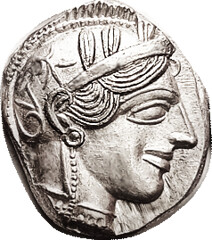
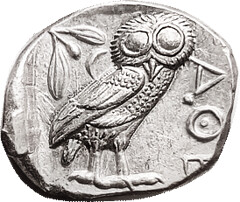
Lot 9
Part of this sale will continue selections from Robinson’s personal collection of Greek and Roman coins. Calling himself a “condition snob,” he had always resolved to keep for himself “only really good stuff.” But after nearly half a century, accumulating thousands of coins, it came time to “decimate” the collection. In Roman times that meant executing every tenth man. Robinson says he similarly picked out about one coin in ten — forcing himself to make choices. Many, he notes are rare and unusual.
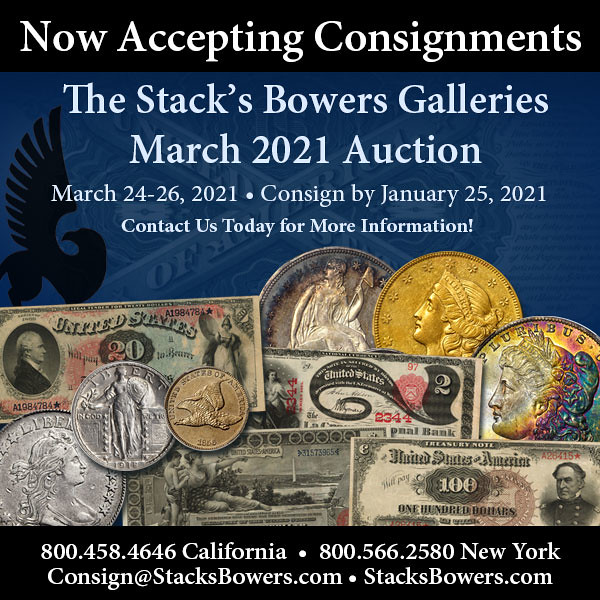
MEDIEVAL AND ROMAN COIN HOARD FOUND IN HUNGARY
A hoard of mostly silver Roman and medieval coins has been unearthed in Hungary. -Editor
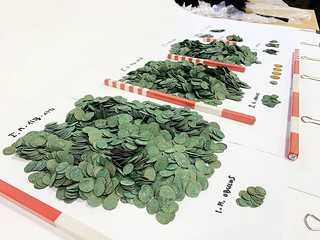 Archaeologists conducting a rescue excavation in the village and commune of Újlengyel, in the Pest County of Central Hungary have unearthed over 7,000 medieval and Roman coins.
Archaeologists conducting a rescue excavation in the village and commune of Újlengyel, in the Pest County of Central Hungary have unearthed over 7,000 medieval and Roman coins.
The excavations were conducted by the Ferenczy Múzeumi Centrum, in collaboration with volunteers from a community archaeology group near the location of a previous hoard, consisting of 150 coins that was discovered in 2019.
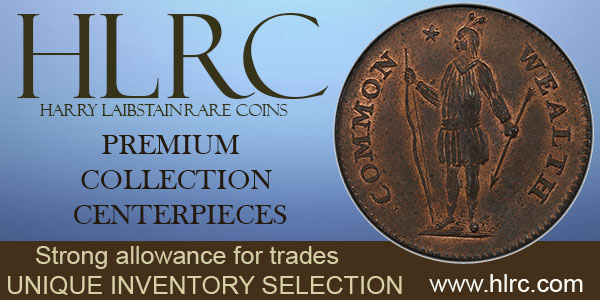
MEDIEVAL JAPANESE COIN HOARD FOUND
Georges Depeyrot forwarded a story in French about the discovery in Japan of a huge hoard of medieval coins. Thanks - great photo! Here's a Google-translated version of the text. -Editor
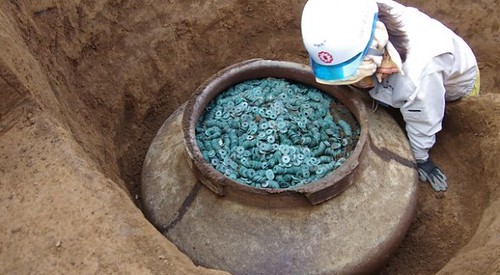
In Japan , north of Tokyo, in Saitama Prefecture , an ancient ship containing thousands of medieval pieces has been discovered and it is the country's greatest archaeological treasure. The loot, made up of tens of thousands of pieces, was found in a ceramic jar which should date from around the 15th century . The exact number of coins is still uncertain, the exact quantity should be between 100,000 and 260,000, between the Japanese, Chinese coins and those from other neighboring countries.
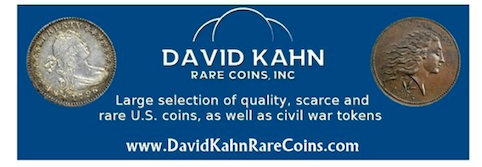
THE TEMPLETON REID MINT
This article from the Foundation for Economic Education discusses the Templeton Reid Mint. I located the mentioned historical marker in The Historical Marker Database and added an image. -Editor
My primary reason for writing this article is to share with readers a small but fascinating bit of monetary history. It is a story commemorated by a historical marker in Gainesville, Georgia that reads as follows:
1830-1831
Two hundred yards west, on the north side of Washington St., is the site of the first private mint in the United States to manufacture gold coins in dollar values. During the Georgia gold rush, trade suffered due to a shortage of sound money. There were few coins in circulation and most business was by barter.
Templeton Reid (ca. 1787-1851), Milledgeville silversmith and expert machinist, saw an answer to the problem. He decided to buy raw gold, refine it, and stamp coins of proven value, acceptable in any transaction. In 1830 he came to Gainesville, Georgia and opened an assay office. With machines and dies of his design and make he began to strike coins of $2.50, $5.00, and $10.00 denominations. Although questioned by many, this was legal under the U.S. Constitution. The business was not profitable and closed in 1831. The Reid gold coins minted in Gainesville are extremely rare and are eagerly sought by collectors.

THE MEXICAN COIN MADE AT THE NEW ORLEANS MINT
Jay Turner published an interesting article on the PCGS blog about the Mexican coin made at the New Orleans Mint. There are two varieties - see the complete article online for more. -Editor
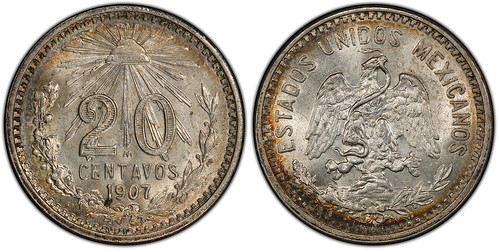
The New Orleans Mint was one of the first three original branch mints established by the United States Mint in 1838. Throughout its history of making coins, much of the bullion used for coinage production came from foreign coin deposits – often in the form of Mexican coinage. Yet, while the New Orleans Mint’s sole task during most of its years of operation was to produce United States coinage, there was one exception: the Mexico 1907 20 Centavos coin.
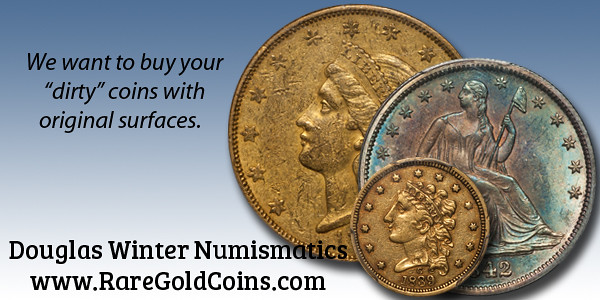
CHINA MINTS SRI LANKA CENTRAL BANK COIN
Kavan Ratnatunga published an article on The Sunday Times of Sri Lanka about a new coin commemorating the country's Central Bank. The coin was minted in China. -Editor
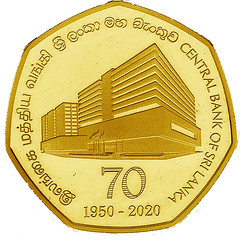
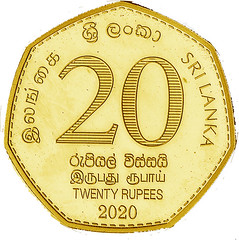
Chinese coins have been found in Yapahuwa and date back to the period when Lanka paid tribute and was visited six times by Admiral Zheng between 1405 and 1433. 600 years later, China has minted coins for the Central Bank (CB) to celebrate its 70th anniversary. A commemorative 20-rupee Aluminium Bronze collector coin was sold to the public on January 1 for Rs.1300.
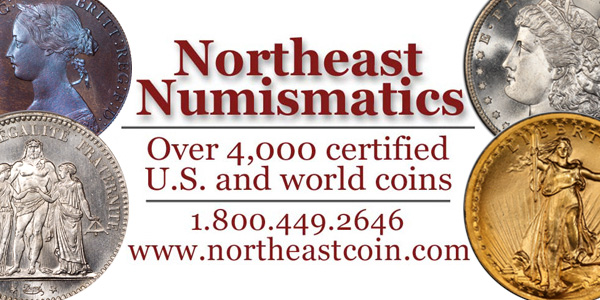
SARAH SOPHIA BANKS AND THE ‘CONTINENTAL DOLLAR’
Catherine Eagleton's 2014 Numismatic Chronicle article Sarah Sophia Banks and the ‘Continental Dollar’ is available on Academia.edu. Here's an excerpt. -Editor
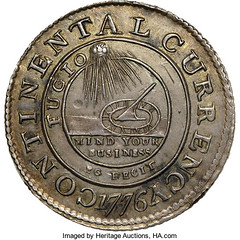 Abstract. Sarah Sophia Banks (1744–1818) was not only an avid coin collector, assembling a numismatic collection of some 9,000 objects, but she also recorded information about where she obtained them, as well as details of their manufacture and uses. This article briefly considers the American coins she collected, now in the British Museum and Royal Mint Museum, which include some of the finest known examples of early US coins. It discusses her as a collector, how her collection was organised, and the information she recorded about one of the most well known of early American coins: the ‘Continental Dollar’ dated 1776. On the basis of information recorded by Sarah Sophia Banks, it is argued that the piece may never have been intended as a coin at all, not struck in America, or even made in 1776. As well as prompting discussion about this important and highly collectible coin, this article therefore underlines the importance of historic collections as sources of information about the objects they contain.
Abstract. Sarah Sophia Banks (1744–1818) was not only an avid coin collector, assembling a numismatic collection of some 9,000 objects, but she also recorded information about where she obtained them, as well as details of their manufacture and uses. This article briefly considers the American coins she collected, now in the British Museum and Royal Mint Museum, which include some of the finest known examples of early US coins. It discusses her as a collector, how her collection was organised, and the information she recorded about one of the most well known of early American coins: the ‘Continental Dollar’ dated 1776. On the basis of information recorded by Sarah Sophia Banks, it is argued that the piece may never have been intended as a coin at all, not struck in America, or even made in 1776. As well as prompting discussion about this important and highly collectible coin, this article therefore underlines the importance of historic collections as sources of information about the objects they contain.
FRANKLIN'S 1729 TRACT ON PAPER CURRENCY
This week I came across a 1729 tract by Ben Franklin titled A Modest Enquiry into the Nature and Necessity of a Paper-Currency. Here's an excerpt from a discussion about it from the National Archives; the linked page includes the full text as well. Coincidentally, today is old Ben's birthday, born in Boston in 1706. -Editor
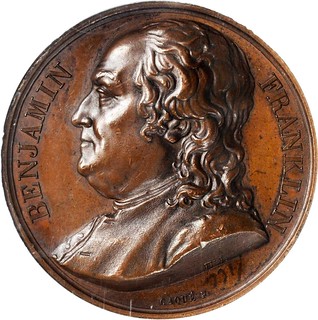 Pennsylvania’s first experience with paper currency came in 1723 with the passage of two acts which provided for issues of bills of credit totaling £45,000. Except for £7,500 allocated to governmental agencies for public expenditure, the new currency was to be loaned to private individuals at 5 per cent interest for specified terms of years on the security of real-estate mortgages. The borrowers were to repay the principal in equal annual installments and the bills of credit received in payment were to be canceled and destroyed. The last of the loans would be repaid and the last bills of credit “sunk” in 1736. But in 1726, when almost £5,000 of the paper money had been retired, complaint about the shrinking currency induced the Assembly to halt the further destruction of the bills and to authorize instead their reissue on new mortgage loans.
Pennsylvania’s first experience with paper currency came in 1723 with the passage of two acts which provided for issues of bills of credit totaling £45,000. Except for £7,500 allocated to governmental agencies for public expenditure, the new currency was to be loaned to private individuals at 5 per cent interest for specified terms of years on the security of real-estate mortgages. The borrowers were to repay the principal in equal annual installments and the bills of credit received in payment were to be canceled and destroyed. The last of the loans would be repaid and the last bills of credit “sunk” in 1736. But in 1726, when almost £5,000 of the paper money had been retired, complaint about the shrinking currency induced the Assembly to halt the further destruction of the bills and to authorize instead their reissue on new mortgage loans.

DEL MONTE BANANA LABEL ERROR NOTE POPULAR
That banana-sticker note is getting a lot of publicity. This CNN article is nicely done and gets into the numismatic details with quotes from NNP's Len Augsburger and Dustin Johnston of Heritage. Here's an excerpt, but be sure to see the complete article online. -Editor
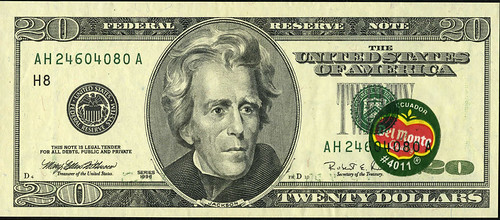
How can a $20 bill be worth over $57,000? Because of a printing mishap.
The "Del Monte note," a rare $20 banknote with a banana sticker on it, is currently for sale through Heritage Auctions, a Dallas-based auction house. Currency collectors are paying close attention and breaking previous bidding records with their offers, according to Heritage Auctions.
"The note has been viewed on our website over 4,300 times," Dustin Johnston told CNN. He's the vice president and managing director of the currency department with Heritage Auctions.
The banknote, from the 1996 series, is unique because of the sticker, which found its way onto it between stages of the printing process, and has part of the Treasury seal and the note's serial number printed over it.
Current bidding for the note is at $57,500, for a total cost of $69,000 after a buyer's premium is applied.
LOOSE CHANGE: JANUARY 17, 2021
Here are some additional items in the media this week that may be of interest. -Editor
Cycles of the US Rare Coin Market
Dave Bowers published a nice article on CoinWeek about the "Cycles of the US Rare Coin Market 1900 to Date." -Editor
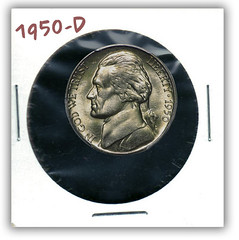 A coin market survey of the early 1900s showed that encased postage stamps and Hard Times tokens were high on the popularity list. At the same time, a Mint State 1893-S Morgan dollar would have attracted very little interest. It seems that fewer than a half dozen numismatists collected Morgan dollars by mintmark varieties, although collecting Philadelphia Mint Proofs was popular. This is certainly strange to contemplate today!
A coin market survey of the early 1900s showed that encased postage stamps and Hard Times tokens were high on the popularity list. At the same time, a Mint State 1893-S Morgan dollar would have attracted very little interest. It seems that fewer than a half dozen numismatists collected Morgan dollars by mintmark varieties, although collecting Philadelphia Mint Proofs was popular. This is certainly strange to contemplate today!
To read the complete article, see:
Q. David Bowers: Cycles of the US Rare Coin Market 1900 to Date
(https://coinweek.com/us-coins/q-david-bowers-cycles-of-the-us-rare-coin-market-1900-to-date/)
Other topics this week include Max von Bahrfeldt, a swallowed coin, and The Sum Total of All Human Knowledge. -Editor

